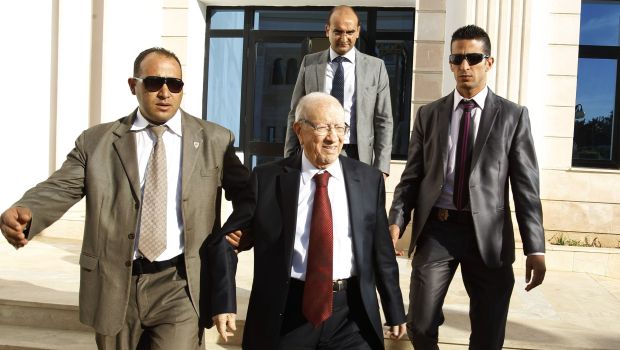
Beji Caid Essebsi (C), former Tunisian prime minister and leader of the Nida Touns (Call of Tunisia) secular party, leaves after a meeting as part of a dialogue between ruling Islamists and the opposition to pave the way for the formation of a transitional government, in Tunis November 4, 2013. (REUTERS/Zoubeir Souissi)
The search for a new premier continues after the President of the Tunisian General Labor Union (UGTT), Hassine Abassi, declared that the quartet had rejected candidates Ahmed Mestiri, selected by the pro-Ennahda Ettakatol Party, and Mohamed Naceur, selected by the main opposition party, the Salvation Front.
The political parties engaged in the dialogue say that a lack of previous experience in the management of state institutions should not be a fundamental obstacle to allowing younger candidates to run. Many potential candidates, such as Bar Association president Chawki Tabib, are prevented from running despite being independent, having the required aptitude and having been accepted by both the current government and the opposition.
In exclusive comments to Asharq Al-Awsat, Mohamed Salah Hadri, the chairman of the Justice and Development Party, said that Tunisia’s next prime minister should be able to oversee the fight against terrorist groups in the country. Criticizing the stated criteria of competency, independence and neutrality as the requirements to become Tunisia’s next PM, Salah Hadri said that improving the socio-economic situation in the country and eradicating terrorism were far more important than political factors.
Union sources, speaking to Asharq Al-Awsat on the condition of anonymity, said that because the political parties taking part in the transition process put forward their own candidates, the UGTT will suggest the name of Mohamed Fadhel Khalil as head of the government, after negotiating parties failed to agreeing on a candidate to lead the country.
Mohamed Fadhel Khalil, originally from the governorate of Gafsa, worked in the Tunisian Ministry of Agriculture during the 1980s before becoming Director General of Phosphates de Gafsa. He then served as governor of Sfax before being appointed Tunisian ambassador to Syria. He subsequently served as Minister of Social Affairs during the 1990s, before becoming ambassador to Algeria in 2007.
In spite of the support for Mohamed Fadhel Khalil by the UGTT, members of Ennahda have already attacked him on the grounds of his alleged links to Beiji Caid Essebsi, the chairman of Call for Tunisia Party. His opponents described him as Essebsi’s closest ally and pointed out that his daughter is a member of Call for Tunisia, which may lead Ennahda to oppose his nomination.
